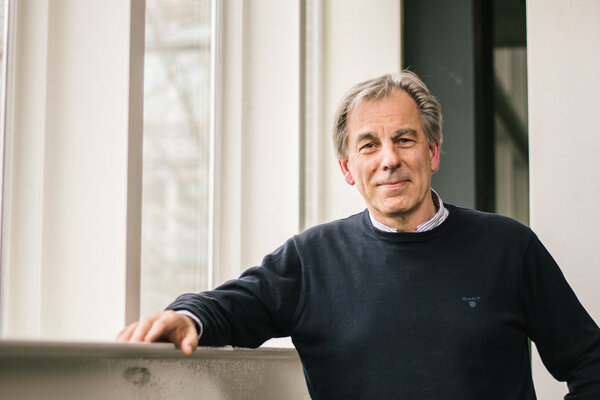Bert Meijer receives Japanese award for principles of supramolecular chemistry

Bert Meijer, professor of Organic Chemistry at TU Eindhoven, will receive the Nagoya Gold Medal on 22 December. The prize is awarded to the world’s best scientists of organic chemistry, a major discipline within the chemistry field. Meijer thereby joins a line of 22 illustrious predecessors, including winners of Nobel prizes, Benjamin Franklin Medals and Wolf awards.
The Nagoya Gold Medal, presented by the Institute of Transformative Bio-Molecules of the university of Nagoya, is one of the most prestigious awards for chemists. The Japanese jury praised “the unique approach and endeavors” of Meijer. According to the jury’s report, he receives the award “for his work on the construction and application of new supramolecular systems with unique properties and functions. Professor Meijer’s work addresses the fundamentals of complex molecular systems. He has contributed greatly to the field of organic chemistry by combining the principles of synthetic and physical organic chemistry, with applications in material sciences and life sciences.”
The considerable academic and scientific influence of Meijer (1955) is apparent from the number of scientific citations of his work: a total of more than 65,000 citations and nine of his academic publications have been cited more than a thousand times. Six of these publications concern the field of supramolecular polymers, an area in which Meijer is one of the founding fathers. More information on Bert Meijer and his work is available on Wikipedia: https://en.wikipedia.org/wiki/Bert_Meijer
Supramolecular chemistry focuses on relatively weak chemical bonds that appear or disappear in response to, for instance, a rise in the temperature or acidity level. These supramolecular bonds enable the development of materials with chosen behavior. Supramolecular compounds are also an essential component of life itself. Meijer, therefore, tries to fathom how life functions and is created at the molecular level, so that the insights gained can be used to develop new materials for medical applications, for example.
The results of Meijer’s work have already found their way into applications in a wide range of domains. One that springs to mind is the widespread use of the modular supramolecular material developed by Meijer, and based on ureidopyrimidinone (UPy), in regenerative medicine. It serves as both the mould and controller at one and the same time for the formation in the body of new human heart valves and blood vessels from the body’s own cells. But in wholly different domains UPy is also beginning to prove its worth, as in self-repairing plastics, wearable electronics and even in make-up and other cosmetics.
Bert Meijer is the founder of the Eindhoven Institute for Complex Molecular Systems (ICMS). He has won several highly reputed awards, including the Spinoza award in 2001, the ACS Award for Polymer Chemistry in 2006, the AkzoNobel Science Award 2010, the International Award of the Society of Polymer Science Japan in 2011, the Cope Scholar Award of the ACS in 2012, and the Prelog Medal of ETH Zürich in 2014, the same year in which he was appointed by the KNAW as Academy Professor, which is intended as a lifetime achievement award. Furthermore, he has been instrumental in two Gravitation programs: Functional Molecular Systems (honored in 2012, subsidy of 27 million euros) and Materials-Driven Regeneration (honored in 2017, 19 million euros).
In this recent video professor Meijer talks about his drive and ambitions.